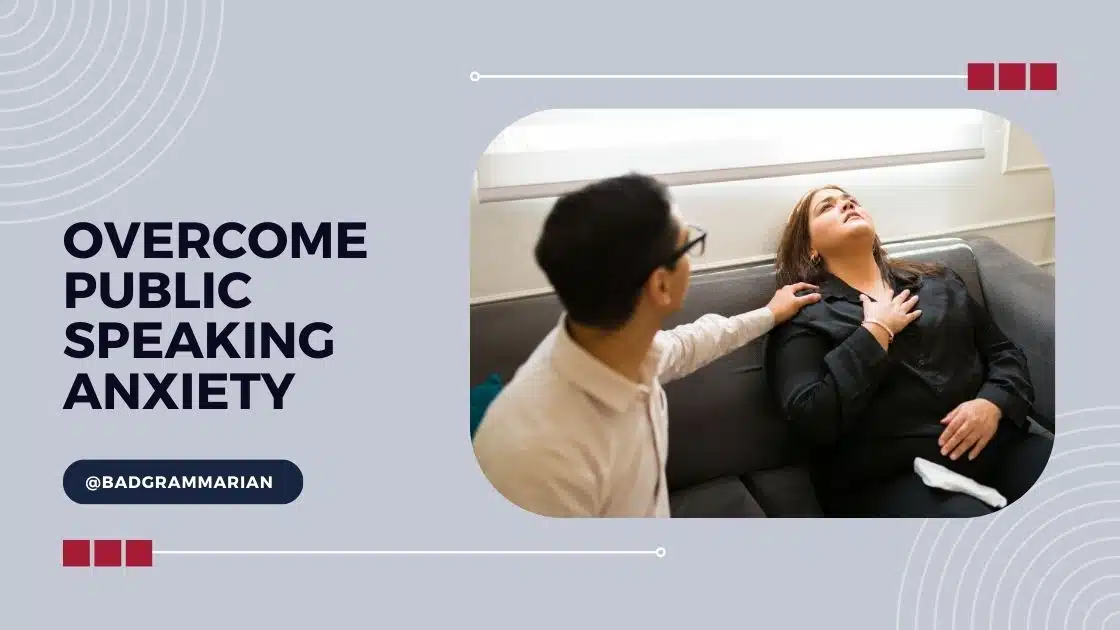Best Noise-Canceling Headphones for Writers: Enhance Focus and Creativity
Conquering the Fear: A Practical Guide to Overcoming Public Speaking Anxiety

Introduction
Public speaking anxiety is remarkably common – so common that many people fear it more than heights, snakes, or even death. The physical symptoms are intense: racing heart, sweaty palms, shaking legs, and a mind that seems to freeze at the worst possible moment.
These reactions stem from both biological and psychological factors. Your body's fight-or-flight response kicks in when faced with an audience, while your mind grapples with fears of judgment, mistakes, or forgetting your material. Yet understanding these mechanisms is the first step to managing them.
The goal isn't to eliminate nervousness – even professional speakers get butterflies. Instead, focus on transforming that nervous energy into enthusiasm and engagement. You can learn to speak confidently while keeping your nerves in check through proper preparation, practice, and proven anxiety management techniques.
Understanding the Roots of Public Speaking Anxiety

Your brain treats speaking in front of others like it's facing danger, even though you're just sharing information. This goes back to ancient times when being accepted by your group meant staying alive. These feelings are just your body's old safety system turning on at the wrong time.
What makes the speaking experience worse for many people is the voice in their head saying things like “I'm going to mess up” or “Everyone will laugh at me.” These negative thoughts can make you more nervous than the actual speech itself. Think about it: you're scaring yourself before you even start talking!
Your body might react in different ways when you're nervous about speaking. You might:
- Feel your heart pounding
- Get shaky hands or legs
- Have a dry mouth
- Find it hard to remember what you want to say
- Feel like your mind goes blank
Understanding why your body and mind react this way is the first step to feeling more confident.
The Power of Preparation: Your Best Weapon Against Fear
The best way to feel less nervous about giving a speech is to prepare really well. Think about it like studying for a big test – the more you know the material, the more confident you feel walking into the classroom.
Good preparation means more than just knowing your topic. You need to know it so well that you could explain it to anyone, even if they asked unexpected questions. When you're the expert in the room, your nervousness naturally goes down because you trust your knowledge.
Here's what thorough preparation looks like:
- Learn more about your topic than you'll actually need
- Write down your main points in order
- Practice your speech several times
- Memorize your opening and closing lines
- Get ready for questions people might ask
- Use small note cards with keywords instead of reading from a script
One important trick is to believe in what you're saying. When you care about your message and know it can help others, you focus less on your nerves and more on sharing something valuable.
Practice is crucial, but don't just practice alone. Try giving your speech to family and friends or recording yourself. You'll feel more natural and confident with the material each time you practice.
Shifting Your Mindset
Even experienced speakers get nervous sometimes. The difference is they've learned to change how they think about speaking in front of others. Instead of seeing it as scary, they see it as a chance to help people.
Here's a simple but powerful trick: stop thinking about yourself and focus on your audience instead. You get more nervous when you're worried about what people think of you. But when you focus on how your message can help others, something interesting happens – your nerves often calm down.
Think about it like this: If you found a great solution to a problem, wouldn't you want to share it with others who have the same problem? That's what public speaking is really about – helping people by sharing something valuable with them.
Many people with a speaking phobia think they're the only ones who feel this way. But even famous speakers once felt terrified of speaking in public. They didn't magically become confident—they practiced changing how they thought about speaking.
Try this: Instead of telling yourself, “I'm going to mess up,” say, “I have something important to share.” Picture yourself giving your speech calmly and clearly. This isn't just positive thinking – it's training your brain to expect success instead of failure.
Practical Strategies for Managing Anxiety
Here's a practical guide about managing nervousness when you need to give a speech, especially if you have a shaky voice or social anxiety disorder:
Controlling Your Body's Response
Your body has natural ways to calm down, and you can use them. Take slow, deep breaths: breathe in for 4 counts, hold for 2, then breathe out for 6. This tells your body “everything is okay” and can slow your racing heart. Moving around before your speech also helps – try walking or stretching to burn off nervous energy.
Make Eye Contact with a Friendly Face
Instead of staring at the back wall, try looking at friendly faces in your audience. Making eye contact with people who are nodding or smiling helps you feel less alone. Think of it like having several mini-conversations during your allotted time, rather than one big scary speech.
Changing How You Think
Replace thoughts like “I'm going to mess up” with “I have something valuable to share.” When you focus on helping your audience instead of worrying about yourself, speaking gets easier. Write “THIS MATTERS” on your notes as a reminder that your message is more important than your nerves.
Handling Nervous Moments
If your voice gets shaky or you make a small mistake, keep going. Most people won't notice unless you point it out. Instead of apologizing for nervousness, use that energy to show enthusiasm for your topic.
Delivery Tips
Starting Your Speech Right
Start by talking like you're having a conversation with friends. Don't try to be loud or fancy – just be natural. This helps both you and your audience feel more comfortable. Remember, most of the general population gets anxious about public speaking, so you're not alone.
Using Your Nervous Energy
Here's something surprising: being nervous makes your speech better! Instead of fighting your nerves, use that energy to be more enthusiastic. When you're excited about your topic, your audience is more likely to get excited. Think of it as turning up the volume of your passion instead of your speech anxiety.
Moving and Connecting
Your body language tells a story, too. Use natural hand movements when you make important points. Just make sure your movements match what you're saying.
Speaking, Not Reading
Try not to read your whole speech from paper. Instead, write down the main points to help you remember. If you need to use notes, that's okay – practice enough so you can look up from them often.
Being Clear About Your Message
Always tell your audience why your topic matters to them. Make it crystal clear what you want them to learn or do. Think about it like giving directions – ensuring everyone knows exactly where they're going.
Conclusion
Fear of public speaking isn't just about being nervous – it's about managing a social phobia that can hold you back in life and work. But here's the good news: Every time you give a speech, you build valuable interpersonal and communication skills to help you in all areas of your life.
By preparing thoroughly, practicing regularly, and focusing on your message instead of your fears, you can transform from someone who dreads speaking to someone who speaks confidently and purposefully. There are great courses on public speaking, as well as some thorough books on public speaking.
Ready to start? Challenge yourself to speak up more often, whether it's asking a question in class, sharing an idea at work, or volunteering to present at a small meeting. Don't let fear stop you from sharing your unique ideas and perspectives – the world needs to hear what you have to say. Take that first step today, and watch your confidence grow with each speaking opportunity.
Yes! I want Bad Grammarian updates and promotions!
No Spam Zone. We will never spam or sell your email address!
Yes! I want Bad Grammarian updates and promotions!
No Spam Zone. We will never spam or sell your email address!


